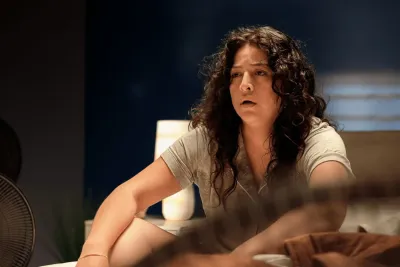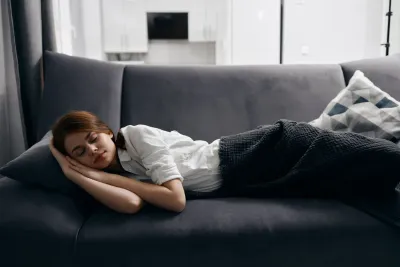
Key Takeaways
Nighttime hot flashes often feel more intense because hormonal changes, natural body temperature shifts, and the sleep environment collide when your body is trying to rest.
- Fluctuating estrogen levels during menopause disrupt the body’s temperature control system, making hot flashes more frequent and harder to manage at night.
- Your core body temperature naturally drops at night to support sleep, but hot flashes interrupt this cooling process, triggering sudden heat, sweating, and wake-ups.
- A warm or poorly ventilated bedroom can amplify nighttime heat buildup, worsening hot flashes and increasing sleep disruptions.
- Lifestyle triggers such as stress, anxiety, alcohol, caffeine, spicy foods, and smoking can intensify hot flashes, with effects often more noticeable during nighttime rest.
- Cooling strategies like lightweight, breathable sleepwear and temperature-controlled mattress toppers help stabilize sleep temperature and reduce nighttime hot flash discomfort.
Cool Down Your Nights with the Chilipad
Beat the heat and enjoy a great night's sleep with the Chilipad. No need to replace your mattress. Our bed cooling systems provide customized temperature control, allowing you to stay cool and comfortable throughout the entire night.
Many women find that their hot flashes intensify at night, making it a struggle to get a good night's sleep. These sudden waves of heat can wake you up, leaving you feeling restless and exhausted. Why is that?
Below, we'll look into some of the top factors contributing to the question, 'Why are my hot flashes worse at night?' These include hormonal shifts, your body's natural temperature rhythms, and daily habits.
You'll also discover practical strategies to cool down and improve your sleep
Understanding Why Hot Flashes Happen at Night
Hot flashes are defined as sudden, intense feelings of heat that can cause sweating, redness, and a rapid heart rate. These episodes are among the most notable symptoms of menopause and can vary in frequency and intensity among women.
Nighttime hot flashes, often referred to as night sweats, are particularly disruptive because they wake you up drenched in sweat, making it difficult to get a restful night’s sleep.
Several factors contribute to the severity of nighttime hot flashes, including hormonal shifts and disruptions in your body's temperature regulation. Understanding these factors can help you manage hot flashes more effectively, leading to improved sleep and not sleeping hot at night.
Hormonal Imbalances During Sleep
Hormonal changes are strongly linked to hot flashes. During the menopause transition, fluctuations in hormone levels, particularly estrogen, can disrupt the body’s ability to regulate temperature. A decrease in estrogen, a critical hormone for temperature regulation, can lead to severe hot flashes at night.
Women experience irregular menstrual cycles and various physical, emotional, and hormonal menopause symptoms during the perimenopause and menopause phases.
Hormonal changes can be more noticeable at night, which often leads to more frequent hot flashes and night sweats. Along with physical symptoms, women experiencing menopause may also face various emotional changes.
The Role of Body Temperature
Our body temperature naturally dips as we sleep, which is part of our natural sleep-wake cycle. However, because of hormonal changes, women going through menopause may experience hot flashes during this temperature drop.
Menopause Study Results: Cooler Sleep, Proven Relief
Hot flashes, night sweats, and restless nights don’t stand a chance. In a recent study, women using our cooling bed systems experienced a 30% improvement in sleep scores and a 50% reduction in hot flash severity. With the Chilipad Dock Pro or Cube, you can take back control, customize your sleep temperature down to 55ºF, and experience relief, night after night.
Why are Hot Flashes Worse at Night?
Hot flashes tend to get worse at night for several reasons. Changes in your hormones and how your body controls its temperature can play a role. Your lifestyle, what you eat, and how your body changes during menopause can all make hot flashes worse at night.
Keeping track of when you have hot flashes and what you were doing before they started can help you figure out what triggers them. When hot flashes get worse, it's a good idea to think about these things.
Tip: If you’re looking for more support and practical tips for navigating menopause and overall wellness, be sure to check out our list of the best health podcasts for women.
Understanding these triggers and how they interact with your body can make a significant difference in managing hot flashes. Let's look at some of these factors in more detail. Some of them might surprise you, while others you might already be familiar with.
Dietary Influences
What you eat and drink can really make a difference in how often and how strong your hot flashes can be. Spicy foods, alcohol, caffeine, and even hot drinks can make your body hotter, which can trigger hot flashes, especially if you have them close to bedtime.
Many women find that following a menopause diet helps them sleep better and feel more comfortable overall. By avoiding foods and drinks that trigger hot flashes, they can reduce the frequency and intensity of these nighttime episodes.

Stress and Anxiety
Stress and anxiety are significant contributors to hot flashes increasing at night. High levels of stress can lead to an increased frequency of menopausal symptoms. If you're feeling stressed before bed, you might be more likely to have a hot flash during the night. This can make it hard to sleep and can affect how you feel overall.
So, what can you do to help relax before bed and lower your stress levels?
Mindfulness practices like meditation can help. These practices can help you wind down and even reduce the number of hot flashes you experience. If you're new to meditation, start slow and gradually incorporate it into your daily bedtime routine.
Related Blog: Getting Started with Yoga Nidra for Sleep. It can help your mind and body relax leading up to bedtime.
These calming techniques can significantly improve your ability to manage the physical and emotional challenges of menopause.
Sleep Environment
A cooler room can make a big difference in how often you have them at night. Try using lightweight, natural fiber sheets and sleepwear, and keeping your bedroom cool. A cooling mattress pad, like the Chilipad Dock Pro, can help you stay cool throughout the night.
It can make a big difference if those hot flashes are keeping you up. Regregulating your body temperature can help you sleep better and minimize those hot and sweaty nights.
- Chilipad Dock Pro: Our best cooling mattress topper and smartest system yet! Faster, quieter, and fully app-controlled with Wi-Fi. Its tubeless pad and advanced water cooling tech bring high-performance comfort straight to your bed.
- Chilipad Cube: A simpler, remote-controlled solution that still delivers the same 55°F to 115°F temperature range. This original cooling mattress topper uses a traditional water-tube design and is a great entry-level choice for anyone looking to improve their sleep environment without all the extra tech.
This is a life saver! If you are going through menopause, you have to get this to save your sanity... - Tracy (Trustpilot Review)
Impact of Sleep Positions
Did you know that how you sleep can actually make a difference with hot flashes? Sometimes, the way you're lying in bed can make the symptoms worse. For example, sleeping on your back might help.
You'll get better air circulation, and hopefully, you won't wake up drenched in sweat. Try experimenting with different sleep positions to find out which ones help you stay cooler at night.
Sleep Disturbances
Experiencing hot flashes at night can severely disrupt your sleep patterns, leading to sleep deprivation and a challenging cycle to break. The more your sleep is interrupted, the more intense your hot flashes may become, potentially resulting in chronic sleep issues that further intensify your menopausal hot flashes.
Sleep disturbances can include frequent awakenings, trouble falling back asleep, and severe night sweats that soak your clothes and bedding. Addressing these disturbances can potentially help effectively manage hot flashes.
The Role of Metabolism During Sleep
Metabolic changes that occur at night can heighten the intensity of hot flashes. As your body digests food and burns calories while you sleep, your body temperature rises, making hot flashes feel more severe.
You can better manage these symptoms by understanding how your metabolism affects your body while you sleep.
Hormonal Activity Peaks
Hormonal activity often increases at night, which can make hot flashes feel even more intense. The sleep-regulating hormone melatonin might also play a role in worsening hot flash symptoms. This is why many women notice their hot flashes are more severe during the night when hormone levels are fluctuating.
Hormone replacement therapy (HRT) may be an option to help manage these symptoms. However, it's always recommended to consult with your healthcare professional to determine the most suitable approach for your individual needs.
Circadian Rhythm Disruption
Hormonal changes linked to menopause can interfere with the body's natural temperature regulation, resulting in more frequent hot flashes at night. The circadian rhythm, which controls sleep and wake cycles, may become imbalanced, making it challenging to maintain stable body temperature.
This imbalance can lead to more frequent and intense hot flashes, adding to the complexity of the menopause transition for many women.
Final Thought
Many women find that menopausal hot flashes can significantly disrupt their sleep. These sudden waves of heat are often more intense at night, making it difficult to fall asleep and stay asleep.
A variety of factors can contribute to these nighttime episodes, including hormonal fluctuations, changes in the body's temperature regulation, stress levels, dietary choices, and even the sleep environment itself.
Understanding these factors can help you control your hot flashes and get better sleep. You may want to tweak your sleep environment, rethink your diet, try relaxation techniques, or even consider medical options like hormone replacement therapy under medical supervision.
Remember, menopause is a personal journey, and what works for one person might not work for another. Finding what helps you feel comfortable during this transition is what will help you navigate these waters.
Common Night Sweats FAQs
Which Cooling Mattress Systems Have the Strongest Clinical Evidence for Reducing Night Sweats?
The Chilipad stands out with clinical research to back it. In a 2023 menopause study, participants using the Chilipad system reported significant reductions in night sweats, hot flashes, and improved sleep quality. It's one of the few cooling mattress systems backed by science.
- 57% saw a decrease in the severity of hot flashes
- 60% saw a decline in the frequency of hot flashes
- 64% saw a decrease in the frequency of night sweats
Why Do I Think Hot Flashes are Worse at Night?
You're not imagining it! Hot flashes often feel more intense at night because your body temperature naturally drops while you sleep. Estrogen plays a crucial role in temperature regulation, and during menopause, estrogen levels in many women can be too low to help the body regulate temperatures. This, combined with factors like stress and a warm bedroom, can trigger those sudden heat waves, making sleeping a real challenge.
Can Foods Trigger Hot Flashes at Night?
Have you ever noticed that some foods seem to trigger your hot flashes? You know, you're not alone if you think this. It's real! Here are a few to keep an eye on and see how your body reacts:
Spicy Foods: That fiery chili or jalapeno poppers can definitely turn up the body heat! Alcohol: Even a small glass of wine can sometimes trigger a hot flash. Caffeine: Coffee, tea, and even some sodas can give your body an extra boost of heat, which might lead to a sudden surge in temperature. Processed Foods: Foods high in sugar and unhealthy fats can also contribute to daytime or night-time hot flashes.
It's important to note that everyone's body is different. What triggers your hot flashes might not affect another.
Why Do Hot Flashes Wake Me Up at Night?
- Hormonal Changes: Fluctuating hormone levels during menopause disrupt the body's temperature regulation, leading to sudden heat sensations.
- Sleep Cycle Disruptions: Hot flashes often occur during specific sleep stages, further disrupting your sleep patterns.
- Increased Sensitivity: Declining estrogen levels can make the body more sensitive to temperature fluctuations, even minor ones.
- Sleep Environment: Warm bedding or a stuffy room can intensify the feeling of heat and can worsen hot flashes.
What Can I Do to Stop Night Sweats During Menopause?
There's some great news. Not only are there natural remedies to help with your hot flashes, but other areas to look into include:
- Optimize Your Sleep Environment: Keep your bedroom cool, use breathable linens, and consider.
- Bed Temperature: Consider using a cooling bed system and cooling mattress pad like the Chiliad Dock Pro to regulate your sleep temperature.
- Dietary Adjustments: Limit alcohol, caffeine, and spicy foods before bed.
- Stress Management: This is a favorite among many women—practice relaxation techniques like deep breathing or meditation.
- **Hormone Therapy: **Discuss hormone therapy options with your doctor if appropriate
Why Do I Get Hot Flashes at Night?
There are several common reasons you might experience hot flashes at night, including:
- Hormonal fluctuations
- Menopause or perimenopause
- Low estrogen levels
- Medications (e.g., antidepressants, hormone therapy)
- Anxiety or stress
- Certain foods or alcohol
- Sleep disorders
- Medical conditions (e.g., hyperthyroidism, infections)
- Room temperature or bedding too warm
- Obesity
My Partner Runs Cold While I’m Having Night Sweats. Which Cooling Bed System Offers Dual-Zone Temperature Control?
The Chilipad cooling mattress topper offers dual-zone temperature control, letting each partner customize their side of the bed—from a cool 55°F to a warm 115°F. Perfect for couples with totally different sleep temperatures.









